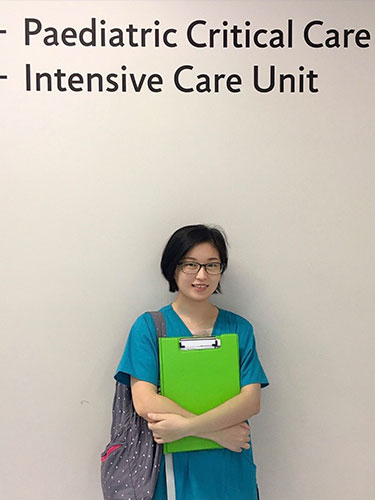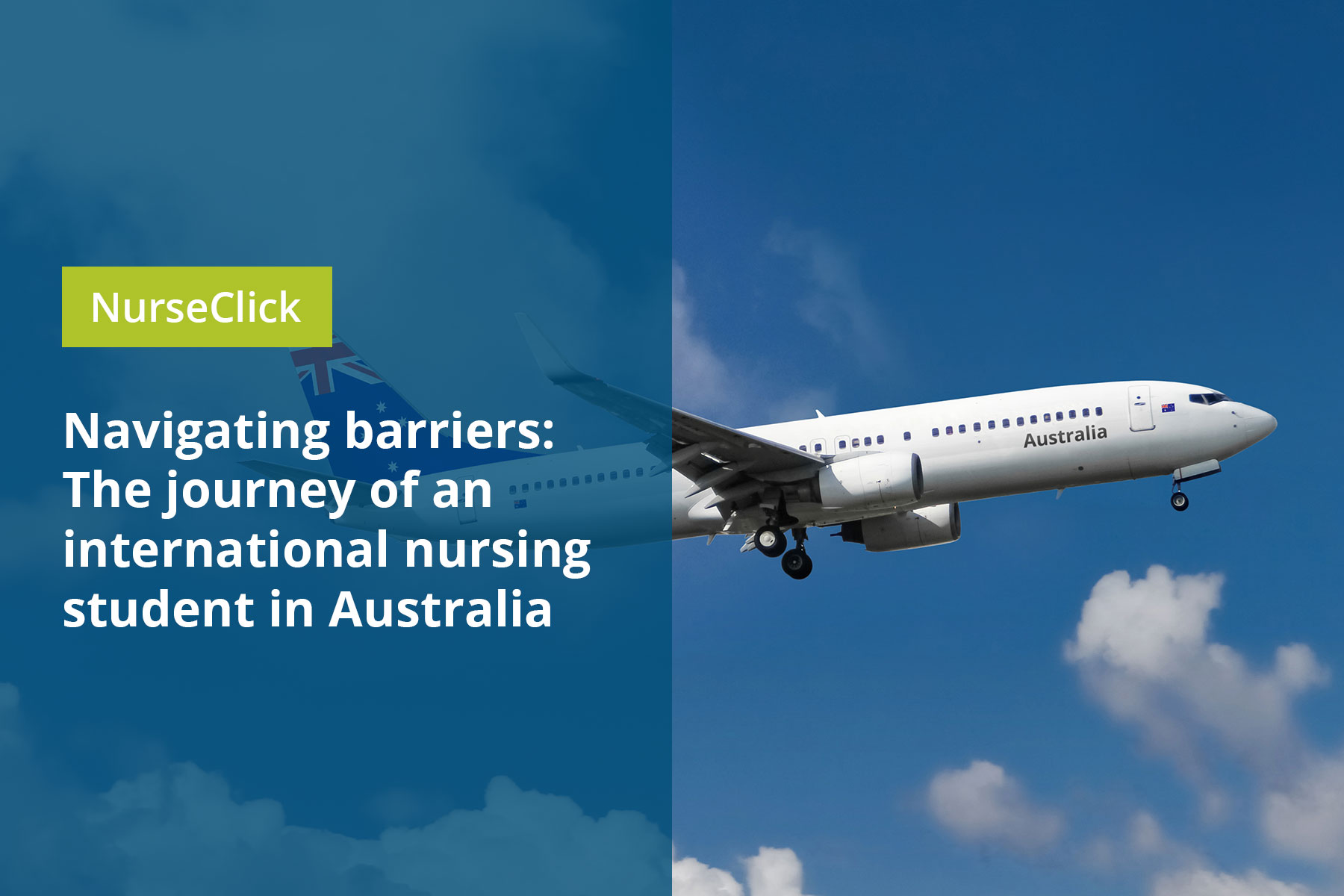With the current shortage and continuing future strong need, nursing is one of Australia’s most in-demand occupations (Australian Government, 2023). In this context, international student nurses play a significant role in addressing the workforce deficit and fostering cultural diversity in the Australian healthcare systems and communities.
Despite the substantial contributions made by international students and registered nurses, many multifaceted challenges persist, influencing their financial, social, physical and mental wellbeing.
Intricate and ever-changing immigration policies often haunt international colleagues. The uncertainty surrounding visa requirements and the potential lack of a clear pathway to permanent residency can significantly impact their career prospects and opportunities, making it difficult to plan for a long-term career and life in Australia.
“Patience and positive affirmation are important for students to experience a sense of belonging”
— Wenjia Wang MACN and Suzanne Volejnikova-Wenger MACN
While cultural differences enrich the diversity of the nursing profession, they also create loneliness and vulnerability among international students. New cultural norms, including language (Attrill et al., 2016), workplace and lifestyle are not only a challenge for clinical practice but also for becoming involved in local communities. The resulting loneliness and vulnerability profoundly affect students’ mental and emotional wellbeing (Edgecombe et al., 2013). Additionally, the protective factor of supportive family close by is often not present (He et al., 2018).
Financial challenges are common among international student nurses. The cost of education, living expenses, visa application fees and potential working limitations due to visa restrictions create significant financial pressures and hinder academic performance.
Wenjia Wang MACN one of the Australian College of Nursing’s (ACN) Emerging Nurse Leaders (ENL) has experienced many of these challenges herself and here she shares her own and some of her peers’ experiences.
Wenjia’s experience
When I graduated in 2021, permanent residency was still the biggest challenge faced by international nursing graduates, simply because it affects our eligibility for job seeking and healthcare service access. For example, international nursing graduates were not eligible for a Postgraduate Medical Council of Victoria match in that state at that time, and most metropolitan Hospital and Health Services in Queensland were required to apply the Applicant Priority Ranking, often placing international nursing graduates at a lower priority, or excluding them entirely.

Photo: Wenjia volunteering at a North Coast Aboriginal
Corporation for Community Health event
Permanent residency is also very important for continuing study. While doing my Graduate Program, the hospital had a collaboration with a university that allowed graduates to simultaneously complete the Graduate Program and a Graduate Certificate course. However, the course does not accept applicants who are holding a working visa. Although job seeking has become easier recently due to staff shortages, the challenges persist. This is why some of my peers had to move interstate in pursuit of permanent residency, which caused significant mental stress and financial burden.

Photo: Wenjia after finishing her ICU placement
Suzanne has her own experience with one aspect of the AHPRA registration process, the English language skills requirement (Nursing and Midwifery Board of Australia, 2018).
Suzanne’s experience
Born in Australia but raised bilingually in Switzerland, I completed all my schooling in Swiss/High German, as well as my first nursing education and registration. Upon returning to Australia, I completed a Bachelor of Nursing Science, achieving academic excellence. However, to meet the NMBA requirements that were current in 2016, I had to undertake an English language test which has made me very empathic toward our international students. The way the test was set, understanding the test structure was more important than English proficiency. I can see how international students would need to sit this exam multiple times, as there was no feedback, and if you failed one section, you had to take the whole test again, adding to the cost.
To address these challenges, a comprehensive, multifaceted strategy involving healthcare providers, educational institutions, and individual stakeholders is imperative. Of course, motivations differ, and each student needs to take responsibility for their own learning and work. Many become successful in their new chosen home and career, as multiple ENLs have proven. However, each of us can contribute to facilitating the integration of international student nurses into the Australian community and workforce.
Enhancing support for international student nurses: Insights from Wenjia and Suzanne
Please do not just accept students into the nursing programs, but provide ongoing support to meet their needs (they are paying upfront). One regional university provides ‘Clinical Conversations’ to support communication in the clinical setting.
Create opportunities for a two-way understanding of how cultural differences impact learning such as when students perceive it to be disrespectful to address a tutor in class or a facilitator on clinical placement. Actively help to normalise seeking support.
Clear communication is key. Australian colloquialism and saying the opposite of what is meant is difficult to interpret and can lead to misunderstanding (Edgecombe et al., 2013).
Despite most buddy nurses and facilitators being very supportive, it does not change the fact that many international student nurses still feel that they are being assessed with every sentence they say. Patience and positive affirmation are important for students to experience a sense of belonging, leading to the clinical placement becoming a safe learning environment.
International student nurses mostly work very hard to achieve similar outcomes to their domestic peers. Encouragement, support and empathetic approaches will help international students to graduate and meet the continuing strong demand for competent and confident registered nurses in Australia.
“I might one day become a facilitator to help make international student nurses feel they belong and provide them with an enjoyable and enriching clinical placement experience.”
— Wenjia Wang MACN
This article was originally published in the Summer 2023 edition of ACN’s quarterly member publication The Hive. Members can access all past editions of The Hive on MyACN . Non-members can get a sneak peek by viewing our open-access articles.
Wenjia Wang MACN is an ACN ENL and Suzanne Volejnikova-Wenger MACN is her ENL mentor. Their mentor-mentee relationship showcases the pivotal role of mentoring in nursing. Mentoring is essential for both international and domestic nursing students and nurses. It helps international students overcome cultural and language barriers, aiding their integration into the nursing field. For domestic nurses, mentoring offers career development and skill enhancement opportunities. That’s why ACN offers one-on-one career mentoring to all members. For those interested in pursuing a leadership career, ACN’s leadership programs provide unique access to targeted leadership mentoring with seasoned nurse leaders. Catering to various professional stages, from Emerging Nurse Leaders to Nurse Unit Managers and Executives, these programs are designed to enhance leadership skills and confidence.
By Wenjia Wang MACN and Suzanne Volejnikova-Wenger MACN
References
Attrill, S., McAllister, S., & Lincoln, M. (2016). Predictors of professional placement outcome : cultural background, English speaking and international student status. Perspectives on Medical Education, 5(4), 222–230. https://doi.org/10.1007/s40037-016-0289-x
Australian Government. (2023, September 25). Skills Priority List. National Skills Commission. https://www.nationalskillscommission.gov.au/topics/skills-priority-list
Edgecombe, K., Jennings, M., & Bowden, M. (2013). International nursing students and what impacts their clinical learning: Literature review. Nurse Education Today, 33(2), 138–142. https://doi.org/10.1016/j.nedt.2012.07.015
He, F. X., Turnbull, B., Kirshbaum, M. N., Phillips, B., & Klainin-Yobas, P. (2018). Assessing stress, protective factors and psychological well-being among undergraduate nursing students. Nurse Education Today, 68, 4–12. https://doi.org/10.1016/j.nedt.2018.05.013
Nursing and Midwifery Board of Australia. (2019). Registration standard: English language skills. https://www.nursingmidwiferyboard.gov.au/registration-standards/english-language-skills.aspx





